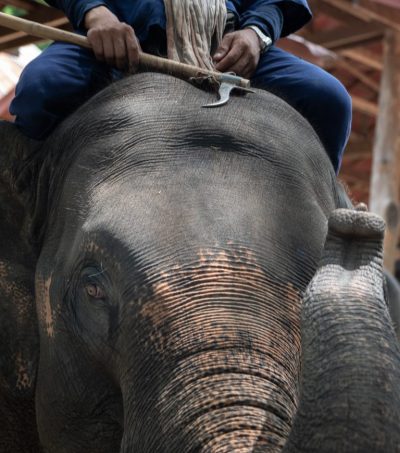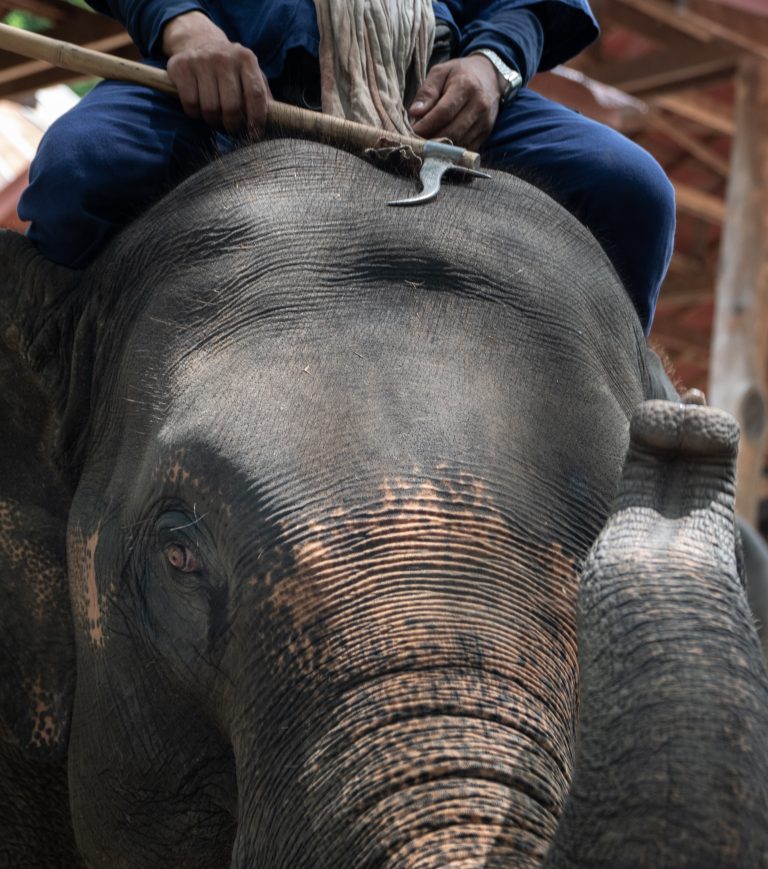




Duncan, you’ve taken monumental strides in animal welfare, from drafting primary legislation to leading a petition with 1.2 million signatures to 10 Downing Street. You have just been named ‘Legal Hero of the Year 2024’ by the Law Society. What inspired you to found STAE and dedicate such extraordinary effort to this cause?
I have always felt a strong affinity for animals—defenceless creatures with a voice we often cannot hear or understand. As humans, we are the only species on Earth that has within its power and dominion the well-being of all other species, a duty I have always been deeply aware of—the need to uphold the dignity and protection of vulnerable creatures.
Asian elephants in particular endure some of the most ruthless suffering in modern tourism and commercial ventures—a trip to India confirmed my worst fears and I felt compelled to act. These gentle giants of the forest, especially their babies, are subjected to unimaginable cruelty during a process called Pajan, where they are beaten and stabbed to break their spirits and make them submissive for use in tourism. Not some age-old tradition but a modern, brutal method designed to quickly turn wild animals into broken, completely submissive husks.
This cruel exploitation, often with the complicity of large international corporations, is what motivated me to establish Save the Asian Elephants (STAE), a charity committed to addressing the extreme suffering of Asian elephants in modern tourism and commercial activities. But what began as a mission to address the suffering of elephants has evolved, and STAE now advocates for the protection of all vertebrate species. This work culminated in the successful drafting and passing of the Animals Low-Welfare Activities Abroad Act, which I’m proud to say is now law.
Having witnessed firsthand the devastating effects of animal exploitation in tourism, how do activities like elephant rides affect both the animals and the tourists involved?
The consequences of animal exploitation in tourism both for humans and animals are devastating. One example that stands out is a venue I visited in Thailand, Nong Nooch Village Garden, where about 60 elephants, half of them babies, are held captive. These elephants are forced to perform in daily shows—activities like playing football, netball, and even stepping carefully over people—all of which are entirely unnatural to their wild instincts. Many of these elephants, particularly the adults have large tusks, which are meant to impress and entertain tourists.
In one tragic incident, a 20-year-old English girl, along with her family, visited the venue and sat in the front row to watch the show. Behind the scenes, the elephants were being stabbed to terrify and subdue them into performing. Until one enormous elephant, unable to endure the abuse any longer, snapped. Its eyes rolled, and it charged at the audience, goring the young girl with its tusks. She died two hours later in her sister’s arms.
This venue continues to operate today, and is still being advertised by numerous UK-based travel companies. Save the Asian Elephants has collected extensive data on the abuse that elephants face in tourism across hundreds of such venues. In fact, over 1,200 travel companies still promote these abusive sites to the UK market. And this is just a microcosm of the wider problem that STAE has been trying to combat through the drafting and successful passing of the Animals Low-Welfare Activities Abroad Act. Which is crucial not only for saving Asian elephants, but also the catastrophic injuries and fatalities inflicted upon both animals and humans alike.

Duncan, you’ve taken monumental strides in animal welfare, from drafting primary legislation to leading a petition with 1.2 million signatures to 10 Downing Street. You have just been named ‘Legal Hero of the Year 2024’ by the Law Society. What inspired you to found STAE and dedicate such extraordinary effort to this cause?
I have always felt a strong affinity for animals—defenceless creatures with a voice we often cannot hear or understand. As humans, we are the only species on Earth that has within its power and dominion the well-being of all other species, a duty I have always been deeply aware of—the need to uphold the dignity and protection of vulnerable creatures.
Asian elephants in particular endure some of the most ruthless suffering in modern tourism and commercial ventures—a trip to India confirmed my worst fears and I felt compelled to act. These gentle giants of the forest, especially their babies, are subjected to unimaginable cruelty during a process called Pajan, where they are beaten and stabbed to break their spirits and make them submissive for use in tourism. Not some age-old tradition but a modern, brutal method designed to quickly turn wild animals into broken, completely submissive husks.
This cruel exploitation, often with the complicity of large international corporations, is what motivated me to establish Save the Asian Elephants (STAE), a charity committed to addressing the extreme suffering of Asian elephants in modern tourism and commercial activities. But what began as a mission to address the suffering of elephants has evolved, and STAE now advocates for the protection of all vertebrate species. This work culminated in the successful drafting and passing of the Animals Low-Welfare Activities Abroad Act, which I’m proud to say is now law.
Having witnessed firsthand the devastating effects of animal exploitation in tourism, how do activities like elephant rides affect both the animals and the tourists involved?
The consequences of animal exploitation in tourism both for humans and animals are devastating. One example that stands out is a venue I visited in Thailand, Nong Nooch Village Garden, where about 60 elephants, half of them babies, are held captive. These elephants are forced to perform in daily shows—activities like playing football, netball, and even stepping carefully over people—all of which are entirely unnatural to their wild instincts. Many of these elephants, particularly the adults have large tusks, which are meant to impress and entertain tourists.
In one tragic incident, a 20-year-old English girl, along with her family, visited the venue and sat in the front row to watch the show. Behind the scenes, the elephants were being stabbed to terrify and subdue them into performing. Until one enormous elephant, unable to endure the abuse any longer, snapped. Its eyes rolled, and it charged at the audience, goring the young girl with its tusks. She died two hours later in her sister’s arms.
This venue continues to operate today, and is still being advertised by numerous UK-based travel companies. Save the Asian Elephants has collected extensive data on the abuse that elephants face in tourism across hundreds of such venues. In fact, over 1,200 travel companies still promote these abusive sites to the UK market. And this is just a microcosm of the wider problem that STAE has been trying to combat through the drafting and successful passing of the Animals Low-Welfare Activities Abroad Act. Which is crucial not only for saving Asian elephants, but also the catastrophic injuries and fatalities inflicted upon both animals and humans alike.
Given your crucial role in developing this legislation, could you outline the chief goals of the Animals Low-Welfare Activities Abroad Act and its potential impact on marketers?
The title of the Act might be a bit of a mouthful, but its importance cannot be overstated. Essentially, this Act makes it an offence in England and Northern Ireland, to advertise or sell access to overseas practices that involve the abuse of any vertebrate species. If the mistreatment would be illegal in the UK, then promoting it abroad is also illegal. This law casts a protective net across the globe, covering not just Asian elephants but countless other species like apes, big cats, dolphins, orcas, bears, bulls, and numerous species of marine and avian life.
For marketers, the message is clear: the law makes advertising or promoting practises involving animal abuse a punishable offence. Upon conviction a fine and extremely serious adverse publicity can be expected. We’ve called for harsher penalties for repeat offenders, including imprisonment for those who persist in marketing abusive animal-tourism practises.
The Act received overwhelming public support throughout its journey through Parliament. Our petition alone gathered 1.2 million signatures, with an additional 35 million supporting related initiatives. Public sentiment is overwhelmingly in favour of protecting animals from cruel practices, so businesses would be wise to reflect on how this aligns with their brand values and consumer expectations. Failing to properly warn customers or continuing to promote unethical animal attractions can lead to insurance cancellations, particularly if they recklessly market dangerous or harmful venues. The aim of this law isn’t to harm travel companies but to shift the industry from brutal, exploitative practices toward responsible and ethical tourism.
With the explosion of social media platforms like TikTok seeing a 410% increase in travel-related searches, what red flags should consumers, brands, and agencies be mindful of when engaging with animal-related activities abroad?
Social media has an immense power—it can either be an agency for good or for harm, depending on how it’s used. This is particularly true when it comes to promoting or discouraging harmful animal tourism practices. The future survival of many endangered species may well depend on how thoughtfully we use these platforms.
When engaging with animal activities abroad, there are several red flags consumers and marketers should look out for. Some are obvious: look closely at the animals. Are they showing signs of distress, injury, or listlessness? But one crucial rule is this: never participate in, sell, or promote activities where there’s direct contact with wild animals. Unlike horses or dogs, which have been domesticated for over 10,000 years, wild animals—such as elephants, lions, and tigers—are not suited for close human interaction without suffering.
These animals often endure horrific abuse to make them compliant for tourist attractions. In the case of big cats, they’re often declawed, defanged, drugged, and have Vaseline smeared into their eyes to keep them docile for photo opportunities. Similarly, elephants are almost invariably beaten into submission, sustaining permanent physical and psychological damage. At STAE, we’ve documented countless instances of abuse, including elephants with stab wounds, chunks of flesh missing, or even eyes gouged out, all to terrify them into performing. These animals are often reduced to shadows of their former selves, displaying psychological distress through constant stereotypical swaying or nodding—symptoms of their deep trauma.
Significant progress has been made toward a more ethical approach to animal tourism, and public support has been overwhelmingly positive. STAE has identified and encouraged support from every sphere of society both in the UK and overseas: business, the professions, academics, environmentalists, biologists, politicians, church and religious communities, the police, and indeed a growing number of travel companies.
Beyond elephants, do any other species stand to benefit from the Animals Low-Welfare Activities Abroad Act?
Absolutely. This legislation has the potential to benefit hundreds of different species once it’s fully implemented. While elephants face some of the worst exploitation, this law is designed to address the welfare of all vertebrate species across the world that are similarly vulnerable to abuse and often on the brink of extinction. Despite their differences, all of these species share a vulnerability to exploitation that causes tremendous suffering. I’d like to read a short excerpt from one of my letters to the government, outlining the broader impact:
“Add to the list baby monkeys enslaved from the forests to a life of selfies and profile pictures. Tiger Cubs used as photo props only to be drugged, chained, and kept in tiny cages for life. Lions, bred to walk with tourists, are sold on to canned hunting facilities to be killed. Dolphins and orcas held in tiny, featureless pools till death. Ostriches ridden for sport, suffering intense pain. All amongst those to gain from this law, whose ultimate goal is to steer the market towards ethical animal tourism.”
The purpose of this Act is not only to protect elephants but all vertebrate species that suffer in the name of tourism. By steering the market towards ethical animal tourism, we hope to create lasting change for animals worldwide and their habitats. It is my hope that this landmark UK law will serve as a blueprint for other countries across Europe, Asia, the United States, and beyond. The ultimate goal is global change—ensuring ethical treatment for all vertebrate species affected by tourism and marketing, and protecting both animals and humans from the consequences of these exploitative practices.
Pringles × Super Mario: The Boss Level Brand Partnership That Won the IPM Grand Prix
Brand Culture, last year’s IPM Grand Prix winners, reveal how Pringles × Super Mario turned a brand partnership into shelf-side excitement, from the Mystery Flavour “question block” idea to collectable character cans.
HFSS Advertising Regulations: What Marketers Need to Know
HFSS regulations have entered a new phase. This article breaks down what the latest rules mean for marketers, where the key risks sit, and how IPM tools and legal support can help.
Promotions Wrapped! Playing Back the Biggest Trends of 2025
From Superman on The Shard to ‘AI slop’, see what cut through in 2025...
Given your crucial role in developing this legislation, could you outline the chief goals of the Animals Low-Welfare Activities Abroad Act and its potential impact on marketers?
The title of the Act might be a bit of a mouthful, but its importance cannot be overstated. Essentially, this Act makes it an offence in England and Northern Ireland, to advertise or sell access to overseas practices that involve the abuse of any vertebrate species. If the mistreatment would be illegal in the UK, then promoting it abroad is also illegal. This law casts a protective net across the globe, covering not just Asian elephants but countless other species like apes, big cats, dolphins, orcas, bears, bulls, and numerous species of marine and avian life.
For marketers, the message is clear: the law makes advertising or promoting practises involving animal abuse a punishable offence. Upon conviction a fine and extremely serious adverse publicity can be expected. We’ve called for harsher penalties for repeat offenders, including imprisonment for those who persist in marketing abusive animal-tourism practises.
The Act received overwhelming public support throughout its journey through Parliament. Our petition alone gathered 1.2 million signatures, with an additional 35 million supporting related initiatives. Public sentiment is overwhelmingly in favour of protecting animals from cruel practices, so businesses would be wise to reflect on how this aligns with their brand values and consumer expectations. Failing to properly warn customers or continuing to promote unethical animal attractions can lead to insurance cancellations, particularly if they recklessly market dangerous or harmful venues. The aim of this law isn’t to harm travel companies but to shift the industry from brutal, exploitative practices toward responsible and ethical tourism.
With the explosion of social media platforms like TikTok seeing a 410% increase in travel-related searches, what red flags should consumers, brands, and agencies be mindful of when engaging with animal-related activities abroad?
Social media has an immense power—it can either be an agency for good or for harm, depending on how it’s used. This is particularly true when it comes to promoting or discouraging harmful animal tourism practices. The future survival of many endangered species may well depend on how thoughtfully we use these platforms.
When engaging with animal activities abroad, there are several red flags consumers and marketers should look out for. Some are obvious: look closely at the animals. Are they showing signs of distress, injury, or listlessness? But one crucial rule is this: never participate in, sell, or promote activities where there’s direct contact with wild animals. Unlike horses or dogs, which have been domesticated for over 10,000 years, wild animals—such as elephants, lions, and tigers—are not suited for close human interaction without suffering.
These animals often endure horrific abuse to make them compliant for tourist attractions. In the case of big cats, they’re often declawed, defanged, drugged, and have Vaseline smeared into their eyes to keep them docile for photo opportunities. Similarly, elephants are almost invariably beaten into submission, sustaining permanent physical and psychological damage. At STAE, we’ve documented countless instances of abuse, including elephants with stab wounds, chunks of flesh missing, or even eyes gouged out, all to terrify them into performing. These animals are often reduced to shadows of their former selves, displaying psychological distress through constant stereotypical swaying or nodding—symptoms of their deep trauma.
Significant progress has been made toward a more ethical approach to animal tourism, and public support has been overwhelmingly positive. STAE has identified and encouraged support from every sphere of society both in the UK and overseas: business, the professions, academics, environmentalists, biologists, politicians, church and religious communities, the police, and indeed a growing number of travel companies.
Animal experiences can be deeply inspiring, both for children and adults. If marketers still wish to include animal activities in their promotions and advertising, are there ethical ways to do so that do not risk directly harming animals?
Seeing animals in the wild or in well-managed reserves where they allow them to live with dignity, interacting naturally with their environments. is far superior to witnessing them confined in cages or enclosures where they may be broken, malnourished, or socially isolated. If we’re to preserve these ancient species, many of which have been on Earth far longer than humans, we must prioritise seeing them in their natural state. Sanctuaries and wildlife reserves that enable their freedom as far as possible, consistent with safety and security. To see animals from a safe and a respectful distance, both safe for humans and respectful to the animals, to recognise their innate dignity and their entitlement to their own life unencumbered by man.
This is what I would urge marketers to promote: ethical, responsible animal tourism, which respects animals in their natural state, rather than turning them into toys or objects for entertainment. They have intrinsic value and a right to live unencumbered by human interference. Marketing campaigns should focus on the beauty of animals in the wild and promote respectful, non-invasive ways to interact with them. Sadly, too often, animals are exploited until they’re no longer useful and then discarded. Marketers and tourists need to shift their perspective—from viewing animals as commodities to understanding their inherent value and role in the world.
With the Animals Low-Welfare Activities Abroad Act now law, and in light of the recent change in government, what are the next steps to implement this legislation, and how can IPM Members support this cause?
The Animals Low-Welfare Activities Abroad Act is now officially law, having passed on 18th September 2023, with King Charles granting Royal Assent just hours after its final parliamentary debate—a process that usually takes weeks or even months.
The next step is that the Environment Secretary—currently Steve Reed—must lay before parliament the necessary regulations to bring this law into practical effect. These “Activity Regulations” will list all those activities harmful to animals that will be included in the ban that provides the essence of this act. My organisation (STAE), has worked alongside many charities to compile a comprehensive list of such activities, backed by substantial evidence, which the coalition I have founded – the Low Welfare Act Coalition of animal protection charities globally – has already assembled and submitted to government with proposed regulations. Now, we need government to act. They have a constitutional obligation to do so, because this is now law and should delays persist, STAE is prepared to seek judicial review to hold the government accountable.
What can IPM Members do to help? The first step is to audit and review the animal tourism experiences you promote or sell. Conduct site inspections, verify animal treatment, and reconsider partnerships that don’t meet high ethical standards. Unfortunately, due diligence is often lacking in the travel and tourism industry, with many companies unaware of the animal abuse involved in the venues they are advertising. Shifting your offerings towards ethical, responsible animal tourism can not only contribute to the protection of these vulnerable species but also provide a strong PR opportunity, positioning your brand as a leader in sustainable and humane travel.
Second, it is entirely in businesses’ interest to understanding and spread the word about this law—to your colleagues, clients, and the wider public. Educating others on its purpose, reach, and impact is essential to driving industry-wide change and ensuring that the message of ethical tourism continues to grow.
Lastly, despite operating on a modest budget and with no paid staff, STAE has been able to leverage and maintain huge public interest and support in these changes. However, with increased support from industry and the public, our impact could be exponentially greater. IPM Members can help by connecting us with new audiences, both on and offline, domestically and overseas. Public speaking engagements, media features, and partnerships are all vital ways to increase awareness and support for our cause. All such initiatives will enhance the impact of the work we’re doing.
“Shifting your offerings towards ethical, responsible animal tourism can not only contribute to the protection of these vulnerable species but also provide a strong PR opportunity, positioning your brand as a leader in sustainable and humane travel.”
“Shifting your offerings towards ethical, responsible animal tourism can not only contribute to the protection of these vulnerable species but also provide a strong PR opportunity, positioning your brand as a leader in sustainable and humane travel.”
Beyond elephants, do any other species stand to benefit from the Animals Low-Welfare Activities Abroad Act?
Absolutely. This legislation has the potential to benefit hundreds of different species once it’s fully implemented. While elephants face some of the worst exploitation, this law is designed to address the welfare of all vertebrate species across the world that are similarly vulnerable to abuse and often on the brink of extinction. Despite their differences, all of these species share a vulnerability to exploitation that causes tremendous suffering. I’d like to read a short excerpt from one of my letters to the government, outlining the broader impact:
“Add to the list baby monkeys enslaved from the forests to a life of selfies and profile pictures. Tiger Cubs used as photo props only to be drugged, chained, and kept in tiny cages for life. Lions, bred to walk with tourists, are sold on to canned hunting facilities to be killed. Dolphins and orcas held in tiny, featureless pools till death. Ostriches ridden for sport, suffering intense pain. All amongst those to gain from this law, whose ultimate goal is to steer the market towards ethical animal tourism.”
The purpose of this Act is not only to protect elephants but all vertebrate species that suffer in the name of tourism. By steering the market towards ethical animal tourism, we hope to create lasting change for animals worldwide and their habitats. It is my hope that this landmark UK law will serve as a blueprint for other countries across Europe, Asia, the United States, and beyond. The ultimate goal is global change—ensuring ethical treatment for all vertebrate species affected by tourism and marketing, and protecting both animals and humans from the consequences of these exploitative practices.
IPM Awards 2024
The winners of the IPM Awards 2024 have been announced, celebrating the most innovative and impactful marketing campaigns across a range of industries. From standout brand activations to breakthrough experiences, this year’s winners have set a new benchmark in promotional marketing.
News
Pringles × Super Mario: The Boss Level Brand Partnership That Won the IPM Grand Prix
Brand Culture, last year’s IPM Grand Prix winners, reveal how Pringles × Super Mario turned a brand partnership into shelf-side excitement, from the Mystery Flavour “question block” idea to collectable character cans.
HFSS Advertising Regulations: What Marketers Need to Know
HFSS regulations have entered a new phase. This article breaks down what the latest rules mean for marketers, where the key risks sit, and how IPM tools and legal support can help.
Promotions Wrapped! Playing Back the Biggest Trends of 2025
From Superman on The Shard to ‘AI slop’, see what cut through in 2025...






